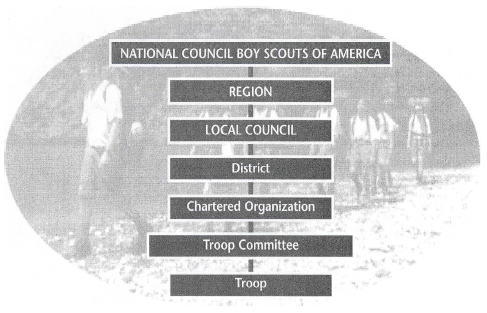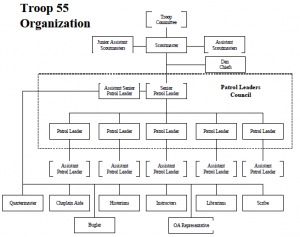The Organization of Scouting
The Boy Scouts of America was incorporated on February 8, 1910, and chartered by Congress in 1916 to provide an educational program for boys and young adults. Boy Scouting was modeled after the Scouting movement founded by Robert S. S. Baden-Powell in England in 1908.
National Council
A volunteer board of directors, the National Executive Board, leads the BSA’s National Council. A staff of professional Scouters performs the administration. Among its major functions, the National Council develops program; sets and maintains quality standards in training, leadership selection, uniforming, registration records, literature development, and advancement requirements; and publishes Boys Life and Scouting magazines.

The National Council maintains national high-adventure bases for use by Scouts in Minnesota, Florida, and New Mexico. It also organizes a national Scout jamboree every four years.
Local Councils
Given there are 50,000 registered Boy Scout troops, the National Council issues a charter to local councils to help administer the program. The United States and its territories are divided into more than 300 local councils. Each council has a headquarters city from which it administers the Scouting program within its geographical boundaries. Like the National Council, volunteers lead the local council, with administration performed by a staff of professional Scouters. The council president is the top volunteer; the Scout executive is the top professional. The local
council’s responsibilities include:
- Registration of units and council personnel.
- Providing facilities and leadership for a year-round outdoor program, including summer camp.
- Granting charters to community organizations. Promoting the Scouting program
- Offering training in a timely manner
Scouting Districts
A Scouting district is a geographical area within the local council, as determined by the council executive board. District leaders mobilize resources to ensure the growth and success of Scouting units within the district’s territory. Each district has a district committee composed of key district Scouters. This committee does not make policy, but rather works through chartered organizations to assure the success of troops. Members of the district committee are volunteers. The district trains adult volunteers, provides district programs for troops such as Camporees and Scouting shows, assists in the formation of new troops, and helps coordinate the Friends of Scouting Campaign. The district also has a commissioner staff that assigns a unit commissioner to give direct coaching and consultation to the troop committee and the Scoutmaster. The Scouting professional who provides district service is the district executive.
The Chartered Organization
Troop 55 is “owned” by its chartered organization, St. Francis Episcopal Church, which receives a national charter yearly to use the Scouting program as a part of its youth work. Chartered organizations, which have goals compatible with those of the Boy Scouts of America, include religious, educational, civic, fraternal, business, labor, governmental bodies, and professional associations.
Each chartered organization using the Scouting program provides a meeting place, selects a Scoutmaster, appoints a Troop Committee Chair and a committee of at least three adults, and chooses a Chartered Organization Representative.
- The Chartered Organization Representative:
- Is a member of the chartered organization.
- Serves as head of “Scouting department” in the organization.
- Secures the troop committee chair and encourages training. Maintains a close liaison with the troop committee chair.
- Helps recruit other adult leaders.
- Serves as liaison between Troop 55 and St Francis.
- Assists with unit rechartering.
- Encourages service to St Francis.
- Is an active and involved member of the district committee.
The chartered organization also approves all adult leaders. As the Chartered Organization Representative is the liaison to the troop’s chartering organization, that person will guide the Troop on St Francis’ policy. The representative will seek the most effective ways to get the organization’s assistance and maintain a mutually satisfactory working relationship with the chartered organization.
In the chartered organization relationship, the Boy Scouts of America provides the program and support services, and the chartered organization provides the adult leadership and uses the program to accomplish its goals for youth.
The Troop Committee
The troop committee’s primary responsibilities are supporting the Scoutmaster in delivering quality troop program, and handling troop administration. As the troop committee works on behalf of the chartered organization, it must be operated within the organization’s policies. Any parent or adult may become a member of the committee by submitting an adult application to the Troop Committee Chair. The committee meets once a month at St. Francis Church at 7:30 PM on the second Monday of every month. See the troop calendar for dates, as dates may be changed
due to holidays or other events.
Uniformed Adult Leadership
Uniformed Adult Leadership of the Troop consisting of the Scoutmaster, and several Assistant Scoutmasters. These adults attend all troop functions and provide guidance, assistance, and support to allow the scouts to implement the Boy-Led concept. All leaders of Troop 55 are required to complete the full regimen of training appropriate for their positions.

